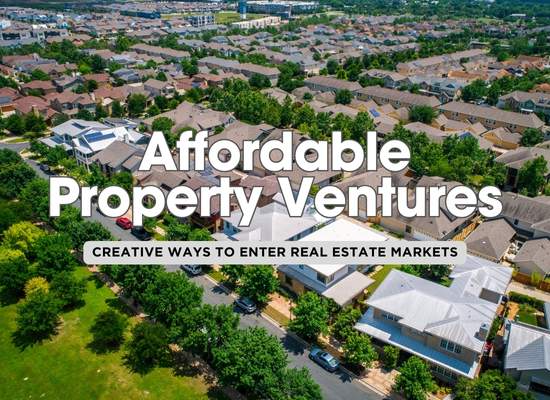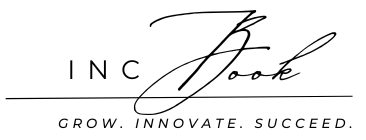
The real estate industry is evolving, and 2025 brings new opportunities for creative entry points into the market. With smart planning and resourcefulness, even those with minimal capital can carve out a path to success. This guide explores 20 innovative, low-cost strategies to dive into real estate and build wealth over time. Let’s go!
1️⃣ Wholesaling Properties
- Overview: Wholesaling involves identifying undervalued properties, securing them under a purchase agreement, and assigning that agreement to another buyer for a fee.
- Why it works: This strategy leverages your negotiation skills and market knowledge instead of capital, allowing you to earn without significant upfront investment.
- Steps to succeed:
- Focus on distressed properties or motivated sellers.
- Network aggressively with real estate investors who are ready to buy.
- Use social media and online platforms to market your deals.
- Cost Estimate: $0–$500 (primarily for advertising or transportation).
- Key Benefit: Low risk with potentially high rewards.
2️⃣ House Hacking
- Concept: Purchase a multi-unit property (like a duplex or triplex), live in one unit, and rent out the others to cover your mortgage and expenses.
- Appeal: House hacking minimizes personal housing costs while building equity in the property.
- How to start:
- Research financing options like FHA loans, which allow lower down payments.
- Choose properties in desirable rental markets.
- Focus on providing top-notch maintenance and amenities to retain tenants.
- Cost Estimate: Requires a down payment, but with FHA or similar loans, this can be as low as 3.5% of the property price.
- Key Benefit: A great way to combine living space with an income-generating asset.
3️⃣ Real Estate Syndication Partnerships
- What it involves: Teaming up with other investors to pool resources and invest in larger real estate deals, such as apartment complexes or commercial spaces.
- Why it’s a game-changer: You can start with a smaller contribution while gaining exposure to bigger opportunities.
- How to contribute:
- Offer your skills in research, management, or deal analysis if you lack funds.
- Leverage platforms like CrowdStreet to connect with syndication deals.
- Understand the legal framework and potential returns before committing.
- Cost Estimate: $1,000–$5,000 (for initial investments in partnerships).
- Key Benefit: Builds experience and connections in high-stakes real estate.
4️⃣ Rental Arbitrage
- The idea: Rent a property under a lease agreement and re-rent it on short-term rental platforms like Airbnb, earning the difference as profit.
- Why it’s booming: The short-term rental market is still thriving in 2025, especially in tourist-heavy or remote work-friendly locations.
- Action Plan:
- Negotiate agreements with landlords who are open to the idea.
- Focus on properties in high-demand areas.
- Furnish the property on a budget to appeal to guests.
- Cost Estimate: $1,000–$5,000 (security deposit, initial rent, and furniture).
- Key Benefit: Enables real estate profits without owning a property.
5️⃣ Real Estate Virtual Assistance
- Role explained: Work remotely for real estate professionals by managing tasks like lead generation, property listings, and client communication.
- Why it’s a smart start: You can learn the ins and outs of the industry while earning money and building relationships.
- Steps to launch:
- Take online courses to master real estate software like MLS or CRMs.
- Market yourself to realtors and investors through platforms like Upwork.
- Deliver exceptional service to gain referrals and long-term contracts.
- Cost Estimate: $0–$500 (to set up a professional profile or take courses).
- Key Benefit: A learning-oriented, risk-free way to enter the market.
6️⃣ Mobile Home Investing
- What makes it unique: Mobile homes often have a lower cost of entry compared to traditional real estate, yet they can generate strong returns when rented or sold.
- How to begin:
- Research mobile home parks where you can purchase units affordably.
- Target areas with a high demand for affordable housing.
- Renovate strategically to add value without overspending.
- Cost Estimate: $2,000–$10,000 for a used mobile home.
- Key Benefit: Lower risk and quicker returns compared to traditional property investments.
7️⃣ Real Estate Photography or Videography
- A fresh angle: Offer specialized services to real estate agents, such as high-quality photos, virtual tours, or drone footage of properties.
- Why it’s lucrative: With the continued growth of online listings, visual content is more critical than ever for attracting buyers.
- Steps to success:
- Invest in a good camera and editing software.
- Learn how to shoot real estate professionally, including lighting and angles.
- Build a portfolio and advertise on social media or through real estate offices.
- Cost Estimate: $1,000–$3,000 for equipment and training.
- Key Benefit: Minimal ongoing costs once the equipment is purchased.
8️⃣ Real Estate Blogging or Vlogging
- The opportunity: Create a blog or YouTube channel focused on real estate trends, market advice, or property tours.
- Why it works: With growing demand for online education, you can monetize through ad revenue, sponsorships, and affiliate marketing.
- Steps to start:
- Choose a niche, such as first-time home buying or real estate investing tips.
- Consistently publish high-quality, engaging content.
- Leverage SEO and social media to grow your audience.
- Cost Estimate: $100–$500 for a website, hosting, or basic filming equipment.
- Key Benefit: Establishes authority in the industry while generating passive income.
9️⃣ Lease Option Agreements
- How it works: Secure a property through a lease option agreement, which gives you the right to buy the property after a set period, often with little or no down payment.
- Why it’s smart: You can control a property without the immediate need for ownership or a mortgage.
- Steps to get started:
- Identify properties where owners are open to flexible terms.
- Ensure the agreement includes terms favorable for both parties.
- Use the lease period to improve the property or build equity.
- Cost Estimate: Often $0–$1,000 upfront for the option fee.
- Key Benefit: Allows you to gain property appreciation without upfront ownership costs.
🔟 Raw Land Flipping
- A growing trend: Purchase inexpensive parcels of raw land, improve or subdivide them, and resell at a profit.
- Why it’s viable: Raw land often costs much less than developed real estate and has lower carrying costs.
- Steps to flip successfully:
- Research underdeveloped areas with growth potential.
- Focus on marketing land for alternative uses like recreational or agricultural purposes.
- Use online marketplaces to reach buyers, such as LandWatch or Zillow.
- Cost Estimate: $500–$5,000 per parcel, depending on location.
- Key Benefit: High-profit potential with fewer complexities compared to developed properties.
1️⃣1️⃣ Real Estate Coaching or Consulting
- Why it’s unique: Share your real estate expertise with beginners, guiding them through the complexities of the industry.
- How to begin:
- Build a portfolio showcasing your successes in real estate.
- Host group coaching sessions or offer one-on-one consulting via platforms like Zoom.
- Create e-books or online courses to expand your reach and passive income.
- Cost Estimate: $0–$500 (for marketing and online tools).
- Key Benefit: Generates income while building your brand and helping others succeed.
1️⃣2️⃣ Becoming a Real Estate Virtual Tour Creator
- A modern touch: Capture immersive 3D property tours for agents and sellers to enhance online listings.
- Why it’s thriving: Virtual tours are essential in the digital-first property market, helping listings stand out.
- Steps to launch:
- Learn to use Matterport or other 3D tour tools.
- Partner with agents and showcase samples of your work.
- Offer subscription packages or one-off pricing for consistent income.
- Cost Estimate: $2,000–$5,000 (for 3D camera and software).
- Key Benefit: High demand with less competition in smaller markets.
1️⃣3️⃣ Crowdfunding Real Estate Investments
- Why it’s innovative: Join others in pooling resources to invest in large real estate projects without significant upfront capital.
- Why it’s accessible: Crowdfunding platforms like Fundrise or RealtyMogul allow even small investors to participate.
- How to start:
- Research platforms and select projects that align with your goals.
- Begin with the minimum investment and reinvest your earnings to grow.
- Diversify across multiple projects to minimize risks.
- Cost Estimate: $100–$500 (initial investment).
- Key Benefit: Gain passive income while diversifying your investment portfolio.
1️⃣4️⃣ Becoming a Tenant Placement Specialist
- A niche role: Help landlords find and screen reliable tenants for their rental properties.
- Why it’s valuable: Many property owners are willing to pay for hassle-free tenant sourcing.
- Steps to succeed:
- Develop a thorough screening process to identify qualified tenants.
- Build relationships with landlords or property management companies.
- Advertise your services on local real estate boards or through community networks.
- Cost Estimate: $0–$300 (for marketing and basic tools).
- Key Benefit: Earn placement fees without owning or managing property.
1️⃣5️⃣ Subleasing for Profit
- A creative strategy: Rent a property on a long-term lease and sublease it to tenants for short-term stays or at higher monthly rates.
- Why it’s profitable: Maximizes rental income in high-demand areas without requiring ownership.
- How to start:
- Negotiate favorable lease terms with landlords open to subleasing.
- Focus on properties in strategic locations like near universities or tourist hotspots.
- Market effectively on platforms like Airbnb or Furnished Finder.
- Cost Estimate: $1,000–$5,000 (for the initial rent, deposit, and setup).
- Key Benefit: Generate steady cash flow while minimizing risks.
1️⃣6️⃣ Renting Out Storage Space
- What it is: Convert unused space, like a garage or basement, into rentable storage for individuals or businesses.
- Why it’s effective: There’s a growing demand for affordable storage solutions, especially in urban areas.
- Steps to succeed:
- Clean and secure the space to make it appealing and functional.
- Advertise on platforms like Neighbor or Craigslist.
- Offer flexible rental terms to attract more clients.
- Cost Estimate: $0–$500 (for upgrades or security).
- Key Benefit: Steady passive income with minimal ongoing management.
1️⃣7️⃣ Investing in Tax Lien Properties
- What makes it unique: Purchase tax liens on properties and earn interest or potentially acquire the property if the owner fails to pay their taxes.
- Why it works: Offers a chance to invest in real estate with a small upfront investment.
- How to begin:
- Research local tax lien auctions and attend them.
- Evaluate the properties tied to the liens to avoid risky investments.
- Understand state-specific tax lien laws before bidding.
- Cost Estimate: $500–$2,000 (depending on lien prices).
- Key Benefit: High potential returns for relatively low investment.
1️⃣8️⃣ Bird Dogging for Real Estate Investors
- What it involves: Find potential deals for real estate investors, such as undervalued or distressed properties, and earn a referral fee.
- Why it’s appealing: No investment required, just market knowledge and networking skills.
- Steps to get started:
- Build a list of active real estate investors looking for deals.
- Scout neighborhoods for properties with potential.
- Negotiate referral fees for every deal closed through your leads.
- Cost Estimate: $0–$100 (for transportation or marketing).
- Key Benefit: Immediate income with no financial risk.
1️⃣9️⃣ Starting a Real Estate Content Business
- The opportunity: Write or create media content for real estate professionals, such as blogs, videos, or social media posts.
- Why it’s in demand: Realtors and agencies need consistent, high-quality content to attract clients.
- How to begin:
- Develop a niche, such as luxury real estate or first-time buyers.
- Offer content packages to agents or brokerages.
- Build a portfolio of sample content to showcase your expertise.
- Cost Estimate: $0–$500 (for website setup and initial tools).
- Key Benefit: Recurring revenue from retainer clients.
2️⃣0️⃣ Offering Real Estate Staging Services
- A hands-on approach: Decorate or furnish homes to make them more appealing to buyers, increasing their sales potential.
- Why it’s lucrative: Well-staged homes sell faster and often for a higher price, making it a valuable service for agents and sellers.
- Steps to succeed:
- Build a network of realtors and property sellers.
- Start with basic staging supplies and expand as you gain clients.
- Offer affordable, creative solutions that fit the property’s target market.
- Cost Estimate: $500–$2,000 (for initial supplies and marketing).
- Key Benefit: A creative and scalable way to earn in the real estate market.
Breaking into real estate in 2025 doesn’t have to require deep pockets. With creativity, resourcefulness, and a willingness to learn, these 20 strategies offer diverse and accessible ways to get started. Whether you’re leveraging technology, partnering with others, or finding innovative ways to add value, the real estate industry is full of opportunities for those willing to put in the effort. Choose a method that aligns with your skills and interests, and start building your real estate journey today!


